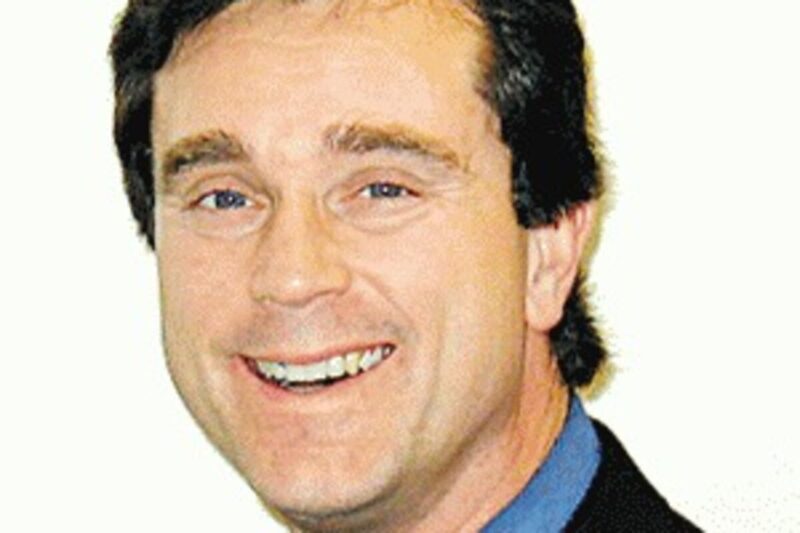Scott Swanson
Of The New Era
State Rep. Jeff Kropf says this will be his last run for the state legislature.
Kropf was in Sweet Home Thursday, March 16, to discuss his plans for his final term in office, assuming he defeats Lebanon Democrat Dan Thackaberry in November for the House District 17 seat.
“I’m running for the last time,” said Kropf, who has served four terms in the Legislature. “I’m term-limiting myself out.”
But before he goes, he has a lot of projects in mind. He has what he calls a “10-point plan” that he hopes to address in what he hopes will be his final two years in office. He said he aims to introduce or co-sponsor legislation addressing issues ranging from charter schools to illegal aliens to the Oregon Department of Transportation.
Two of his goals involve sweeping reforms of the state’s school system and privatizing most of ODOT’s functions. He says he will propose that Oregon adopt the model employed by New Zealand in both areas.
At the top of the list is education reform, Kropf said he believes Oregon should convert all its public schools to charter schools, as New Zealand did in 1989.
“The only way to improve public schools in America is to get parents involved,” he said. He said the New Zealand model for grades K through 12 would restore local control to schools, improve parental involvement and produce “better results for the same money we spend today.”
Like schools in Sweet Home operated years ago, Kropf plans to propose that each school have its own board, composed primarily of parents, and that teachers be rewarded based on their results.
“My view is I want you to get the job done as a teacher, regardless of whether you have a certificate with your name on it or not,” he said. “I want people who are effective.”
Kropf also thinks the state should privatize ODOT, also based on the model employed by New Zealand beginning in 1986.
He said New Zealand’s Department of Transportation and its roads network is about the same size as Oregon’s. New Zealand took 12 years to privatize its system, taking it from 5,000 to 250 employees, who mainly manage contracts with private companies.
“Breaking up the DOT in New Zealand enabled them to do a better job,” he said. “The whole idea with ODOT is to transform it into an efficient, consumer-friendly organization.”
Other issues he plans to address include:
– Public Safety — Communications for police in the state and funding for the Oregon State Police have to be addressed, he said. The digital communications that all public safety agencies will be required to have by 2011 will cost an estimated $300 million, funding that will need to be developed. Communication between police agencies needs to be improved and permanent funding for the OSP needs to be developed to stop the loss of promising young patrol officers, trained by the state, who are lured away by other agencies that offer more money. In addition, he said, incentives need to be offered to volunteer firefighters, who are getting harder to recruit, and more realistic training exercises need to be developed to cope with the challenges facing the public safety community today.
Also, “we need more intelligence analysts to look at the information we get,” said Kropf, who sits on the Joint Legislative Committee on Emergency Preparedness and on the National Conference of State Legislatures Homeland Defense and Emergency Preparedness Committee. “We get a lot of information in the state of Oregon. We don’t have the manpower to do it. That’s very concerning for me.”
– Illegal Aliens — Kropf, who said he’s flying to Arizona during the first week of April to join the Minutemen border patrol effort for a few days, wants to deny taxpayer-funded services and driver’s licenses to illegal aliens and allow local law enforcement agencies more flexibility to work with federal immigration officials.
“Our laws have to mean something,” he said. “When government loses its moral authority to demand that people obey our laws when they make special exemptions for people who break our laws, it’s just morally wrong.”
– State Spending — Kropf wants to introduce a constitutional state spending limit and a rainy day fund in the state budget. He also wants to require that the state budget be posted online in a form readable and understandable by the public, and improve “accountability processes to protect taxpayers.”
– Military — Kropf wants to fix a problem he said happened with a law he and others got passed last year in the Legislature to grant $1,000 property tax credits to soldiers serving overseas in the National Guard. The law was intended to be retroactive to 2004, but it didn’t read that way when it was passed.
“I don’t know how I missed that,” Kropf said, vowing he’s going to fix it this time around.
He also wants to improve health care for National Guard veterans, who in some parts of the state have to drive long distances to find a doctor who will see them, since the federal Tri-Care health system pays less than most insurance companies and many doctors don’t want Tri-Care patients.
Kropf said he plans to provide a $5,000 tax credit to doctors who will see Tri-Care-covered patients.
– Health Care — Kropf would like to create an Oregon Health Savings Account that is more flexible and “totally tax free,” enable local Area Agencies on Aging to be more self-sufficient “to meet the coming demands from the baby boomers” and to break up the Department of Human Services “to become more accountable and efficient.”
– “There are going to be twice as many retirees in Oregon in 2030 as there are now,” he said. “There’s not going to be enough tax money.”
He warned that Oregonians will not support more taxes to raise money for those seniors.
“I think what we need to create is a change in mindset that government is going to provide for us,” he said. “I need to save something because govermen t isn’t going to be there for me.”
– Land use reform — Kropf wants to preserve what he says is the intent of Measure 37 by allowing property owners greater flexibility in dividing their property and allowing buyers to have the same opportunities to build on land subdivided in accordance with Measure 37.
He also said he’s drafting legislation make it illegal for governments to take private land by eminent domain and then give it to another private landowner.
The penalty, he said, should be five times the real market value of the property.





